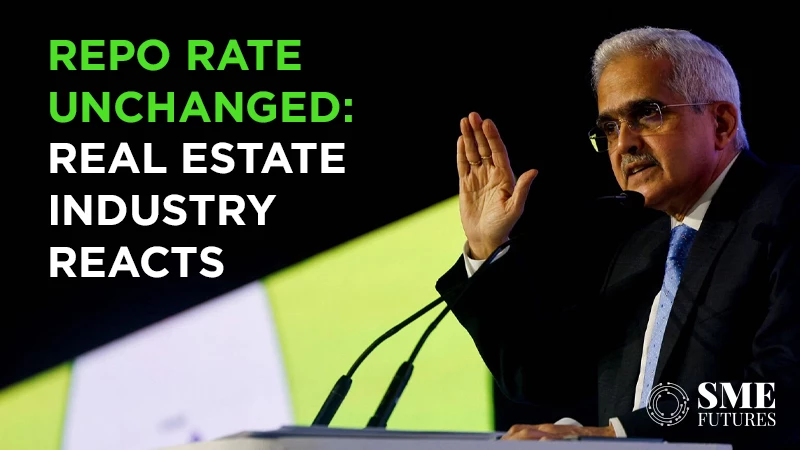The Reserve Bank of India (RBI) has once again held the repo rate steady at 6.5 per cent, marking the tenth consecutive time that the rate has remained unchanged. While this decision was widely expected, it has led to mixed reactions from real estate industry leaders who see both positives and missed opportunities as they navigate the current economic landscape.
The move, coupled with the RBI’s shift to a neutral stance, is being viewed as a strategic attempt to balance inflation with economic growth, especially in light of global uncertainties. However, for the real estate sector, where borrowing costs play a critical role in both demand and supply, this decision has varied implications.
Read Also: Why the RBI decided not to change the repo rate again
Missed opportunity for real estate demand surge
On the flip side, experts like Anurag Goel, Director at Goel Ganga Developments, believe that while the unchanged rate provides stability, it also misses the opportunity to boost demand, especially during the festive season. “There was nothing particularly surprising in what RBI Governor Das said regarding the repo rate remaining unchanged. However, keeping the status quo of EMIs vertically disadvantages the real estate sector,” he said. He further explained that a rate cut could have delivered much-needed demand during the all-important festive period when homebuyers are typically more active.
Govind Krishnan Muthukumar, Co-founder & Director, Tridhaatu Realty opines, “While the unchanged policy rate may provide stability in the short term, the real estate sector continues to hope for a more accommodative stance in the future that could lower interest rates and boost homebuyer sentiments. With GDP growth projected at 7.2 per cent for FY25, we are optimistic about the long-term potential of the Indian economy. Any future rate reductions could further bolster homebuyer sentiment, encouraging investments in the real estate sector, thereby contributing to the overall economic growth.”
Positive impact on housing market stability
For others, the RBI’s decision provides much-needed stability in the housing market. According to LC Mittal, Director of Motia Group, “The shift to a neutral stance signals the RBI’s commitment to aligning inflation with growth, ensuring favorable market conditions for sectors like real estate. Home loan EMIs are likely to remain steady, which should positively impact housing demand, especially as property prices continue to rise.”
Amit Kumar Malhotra Head of Sales & Marketing of Ambience Group said, “The RBI’s decision to keep the key rates unchanged reflects a balanced approach to the current economic landscape. The move to stabilise the rates, particularly the reverse repo at 3.35 per cent and the inflation projection at 4.5 per cent, provides a favorable environment for the housing sector. The controlled inflation outlook, despite the potential upward risks from rising metal prices, will help maintain home loan affordability, which is crucial for both homebuyers and developers. We remain optimistic that this consistency in monetary policy will support steady demand in the residential real estate market, further encouraging the overall growth of the sector.”
Kushagr Ansal, Director of Ansal Housing feels, this stability benefits both buyers and developers by boosting consumer confidence and encouraging investment in the sector. “The RBI’s decision is also expected to drive the launch of new projects and promote expansion in emerging areas of interest.”
Neutral stance raises cautious optimism
Aman Gupta, Director of RPS Group, highlighted that the neutral stance adopted by the RBI signals cautious optimism towards managing inflation and growth. “The RBI’s neutral stance after holding the repo rate at 6.5 per cent indicates a cautious yet optimistic approach. It reduces volatility in borrowing rates, which is a concern for real estate contractors. However, continuous vigilance is required to adapt to any shifts in the economic landscape,” he commented.
Adding to it, Shraddha Kedia-Agarwal, Director, Transcon Developers said, “With the moderation in inflation expected to remain gradual and uneven, we will need to stay vigilant in our planning and investment strategies.”
Challenges in the real estate market
Keshav Mangla, General Manager of Forteasia Realty Pvt Ltd, echoed concerns about the potential challenges for the real estate sector. “While stable interest rates can support planning and long-term investments, they also cut off the advantage that comes with declining interest rates. With the onset of the festive season, real estate developers might need to offer additional price cuts to stimulate sales,” he said, pointing out that the unchanged GDP growth and inflation targets could pose a challenge to achieving efficient economic growth.
The RBI’s decision to keep the repo rate steady at 6.5 per cent for the 10th consecutive time has been met with a mixed bag of reactions from the real estate sector. While some industry leaders appreciate the stability it brings for long-term planning, others lament the missed opportunity to stimulate demand, particularly during the festive season. As the industry navigates these developments, stakeholders are keeping a close eye on inflation, geopolitical factors, and consumer behavior to adapt their strategies accordingly.











